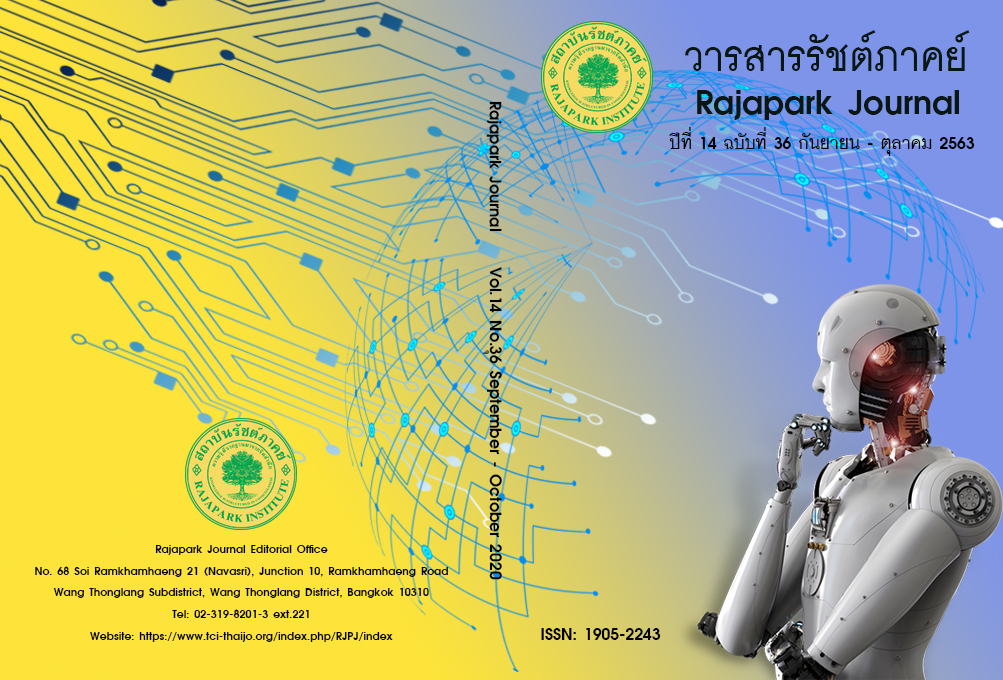Relationship between Emotional Intelligence and Transformational Leadership of School Administrators under the Secondary Educational Service Area Office 2
Main Article Content
Abstract
The purpose of this research was to 1) investigate the emotional intelligence level of school administrators under the Secondary Educational Service Area Office 2, 2) investigate the transformational leadership level of school administrators under the Secondary Educational Service Area Office 2, and 3) investigate the relationship between emotional intelligence and transformational leadership of school administrators under the Secondary Educational Service Area Office 2. The population used in this research included 260 heads of learning-subject groups in 52 schools (five heads each) under the Secondary Educational Service Area Office 2 during the academic year 2017. The sample size was determined by Krejcie and Morgan’s table at the 95% confidence level (Krejcie and Morgan, 1970: cited in Nuanmai, A. (2006) and the samples were 155 heads from 31 schools. The research tool used in the study was a scale-rating questionnaire. The statistics used for data analysis were percentage, mean, standard deviation, and Pearson's correlation coefficient. The data analysis was done by computer software. The research found that: 1)Emotional intelligence of school administrators under the Secondary Educational Service Area Office 2, both overall and individual aspects, was at a high level 2)Transformational leadership of school administrators under the Secondary Educational Service Area Office 2, both overall and individual aspects, was at a high level 3)Relationship between emotional intelligence and transformational leadership of school administrators under the Secondary Educational Service Area Office 2 was positive with the .01 level of statistical significance.
Article Details
Views and opinions appearing in the Journal it is the responsibility of the author of the article, and does not constitute the view and responsibility of the editorial team.
References
Chulacharitta, E. (2005). EQ Thai Wisdom. Bangkok: Kledthai.
Dechsatan, N., Paophan, C., & Rittilun, S. (2014). Transformational Leadership of Institution Administrators Affiliated with Kalasin Primary Educational Service Area Office 3. Prae-wa Kalasin Journal of Kalasin University, 1(3), 83-99.
Indusuta, K. (2011). Emotional Intelligence of Administrators in Basic Education School. Doctor of Philosophy Educational Administration, Silpakorn University.
Jedaman, P. (2017). Leadership for Change, 21st Century: Thailand 4.0. Retrieved May, 17, 2018, from http://udonthani.labour.go.th/2018/2017-05-08-07-35-57/195-o
Jedeekhum, T. (2016). A Study the Relationship between Leadership of School Administrators with Administrators’ Effcttveness in School under Chanthaburi Primary Educational Service Area Office. Thesis. M.Ed. (Educational Administration). Chanthaburi: Rambhai Barni Rajabhat University.
Kaewkittikhun, D. (2006). Emotional quotient of private school administrators in Amphoe Bang Pong the Rachaburi Education Service Area Office 2. Master of Education, Educational administration. Silpakorn University.
Krejcie, R. V. & Morgan, D. W. (1970). Determining Sample Size for Research Activities. Educational and Psychological Measurement, 30(3), 607-610.
Likert, R. A. (1932). Technique for the Measurement of Attitude. Archives Psychological. 3(1), 42-48.
Nasari, A. (2009). The relationship between emotional quotient and the school administrators’ administrative decision making behaviors in Ubon Ratchathani Educational Service Area 3. Master’s thesis, Ubon Ratchathani University.
Nuanmai, A. (2006). A correlative study of some factors affecting emotional quotient (EQ) and adversity quotient (AQ) of mattayomsuksa III students under the General Education Department, Angthong. Master’s thesis, Srinakharinwirot University.
Promsri, C. (2005). Q - You should have all-round intelligence that every executive/leader should have. Bangkok: Expernet.
Punnittamai, W (2008). Emotional quotient-EQ: Index for Happiness and Success in Life (7th ed.). Bangkok: Chulalongkorn University Press.
Silpjaru, T. (2008). Research and statistical data analysis with SPSS and AMOS. Bangkok: V-interprint.
Sirichokwattana, K. (2008). E.Q. Clever Management of Emotions. Bangkok: Shishini International.
Siripattanakosol, S. (2010). The Emotional Quotient of School Principals under The Office of Sakaeo Educational Service Area 2. Master’s thesis, Burapha University.
Srisa-Ard, B. (2002). basic research (7th ed.). Bangkok: Suweeriyasan.
Steven, Stein. (1997, March). “Emotional Intelligence (EQ) Gets Better with Age”. New York, 9(3), 47. Retrieved form http://eqi.mhs.com/press4.html.
Tonkhambai, N. (2012). The Relationship between Transformational Leadership and Effectiveness of Private School under the Office of Udon Thani Nongbualamphu and Nongkhai Primary Educational Service Area. Master’s thesis, Udon Thani Rajabhat University.
Tubtim, T. (2014). Emotional Quotient of the Primary School Administrators and Teachers under the Singburi Primary Educational Service Area Office. Master’s thesis, Thepsatri Rajabhat University.
Watcharakate, S. (2014). Transformational Leadership: The Challenges of Nurse Leaders. The Journal of the Royal Thai Army Nurses, 5(3), 58-63.
Wiset, P. (2011). The Relationship between Emotional Quotient of School Administrators and Job Satisfaction of Teachers Amphoe Banna Under the office of Nakhon Nayok Primary Educational Service Area. Master’s thesis, Rajamangala University of Technology Thanyaburi.
Wongsakul, P. (2012). The Correlation of Leadership for Changes and Select Effectiveness of Bangkok Metropolitan School in Latkrabang District. Master’s thesis, Dhurakij Pundit University.


